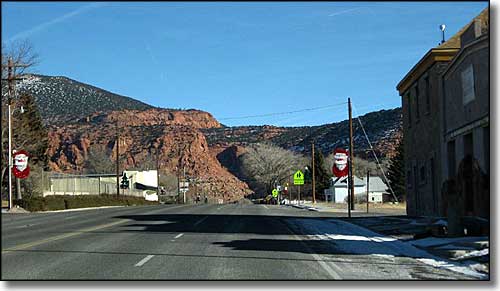
Bicknell, Utah

Bicknell, Utah
A.K. Thurber built the first home in the Bicknell area but he picked a sandy spot with a non-potable water supply. In 1895, the settlement that grew up around his place moved to a better, more stable location with drinkable water close by. Back in those days the place was named "Thurber" or "Thurber Town." Then in 1914 the Education Commissioner for Rhode Island, a Thomas W. Bicknell, offered to donate a 1,000-volume library to any town in Utah that would take his name. There was another town in Utah interested in the prize, too. So in April 1916, "Thurber" became Bicknell and "Grayson" became Blanding (the maiden name of Mr. Bicknell's wife) and the 2 towns split the offered library gift, each getting 500 books.
In those days, the Thurber Ward was established to oversee the Mormon families in the area. Most of them were wheat farmers and cattle and sheep ranchers. Together, they built the Relief Society Hall, finishing the construction in 1899. It served for school, church meetings, amusements and Relief Society functions. The Daughters of the Utah Pioneers bought the building in 1971 and restored it.
A few miles east of Bicknell, a Danish miller named Hans Peter Nielsen built a gristmill in 1883 near the Fremont River. It burned down a few years later but was completely rebuilt by 1890. It was rebuilt again in 1910 with a new dust collector, a water-power-driven turbine with belting on native wood pulleys and a pair of new scales: one for buying the wheat and another for weighing the packed flour. The gristmill closed around 1935 (the heart of the Dust Bowl years). This is presently the only gristmill in Utah that still has its original water-powered workings in place.
Today, Bicknell lays claim to being the smallest town in America with a year-round movie theater. The Bicknell International Film Festival is hosted in the theater every year.
Latitude: 38.3414°N
Longitude: 111.5455°W
Incorporated: 1939
Elevation: 7,123'
Education:
High School or Higher: 86.4%
Bachelor's Degree or Higher: 19.2%
Graduate or Professional Degree: 4.2%
Median Resident Age: 30.5 Years
Estimated Median Household Income: $48,100
Estimated Median Home Value: $173,600
Population Density: 745 People per Square Mile
2011 Cost of Living Index for Bicknell: 83.9
Major Industries:
Educational Services, Agriculture, Health Care, Construction, Lodging & Food Services, Social Services, Wood Products, Transportation Services, Real Estate Services
Unemployed (March 2011): 13.0%
Population Demographics: 2010
| Total Population | 327 |
| Males | 168 |
| Females | 159 |
| Population by Age | |
| Under 18 | 92 |
| 18 & over | 235 |
| 20-24 | 16 |
| 25-34 | 35 |
| 35-49 | 55 |
| 50-64 | 66 |
| 65 & over | 55 |
| Population by Ethnicity | |
| Hispanic or Latino | 11 |
| Non Hispanic or Latino | 316 |
| Population by Race | |
| White | 314 |
| African-American | 0 |
| Asian | 1 |
| Native American | 2 |
| Hawaiian or Pacific Islander | 1 |
| Other | 6 |
| Two or more | 3 |
